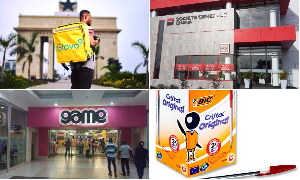- Home - News
- TWI News | TV
- Polls
- Year In Review
- News Archive
- Crime & Punishment
- Politics
- Regional
- Editorial
- Health
- Ghanaians Abroad
- Tabloid
- Africa
- Religion
- Election 2020
- Coronavirus
- News Videos | TV
- Photo Archives
- News Headlines
- Press Release
Editorial News of Friday, 7 November 2003
Source: Public Agenda
Education Refrom Is Defective -Public Agenda
Presidential committee on education reform programme says over-emphasis on grammer undermines efforts to build a technological society
The President’s Committee on Review of Education Reforms has detected a number of defects in the existing educational structure.
These include a system where grammar and general education is overemphasized to the detriment of technical and vocational education and training. Currently there are 474 state senior secondary schools as against only 23state technical and vocational institutes.
The report explained that the administrative structure of vocational and technical training has not been developed and effectively implemented and this has made the Junior Secondary School (JSS) the weakest link in this area.
“There is also neglect of teacher education to produce teachers to cater for the new system, especially for the technical and vocational education introduced into the mainstream educational system after the reforms.”
The JSS and the Senior Secondary Schools (SSS) therefore lack teachers to teach the technical and vocational subjects.
The 20- member Committee chaired by Prof. Jophus Anamoah- Mensah was commissioned by the President in January 2002 to undertake a review of the entire education system after 15 years of educational reforms in the country. The Committee said the world is facing rapid challenges in all aspects of life and as such the educational system must provide opportunities at both formal and informal levels for individuals to improve on their competences in order to meet the demands of the changing times.
“It should provide individuals with skills which will enable them continue to search for new knowledge in order to upgrade themselves,” the report further said.
The existing educational structure, according to the committee, neglects the large informal or apprenticeship sector that provides training opportunities for a large number of pupils by master craftsmen in various trades.
It is estimated that 60 percent of JSS school leavers who are unable to proceed to SSS level find themselves in the informal sector.
Also at the pre tertiary level, the report said there is limited progression within the technical and vocational areas.
“Products from technical and vocational institutes do not have easy access to the polytechnics to do tertiary programmes,” the report said adding similarly, products from the polytechnics have limited opportunities for progression beyond the Higher National Diploma (HND).
The current educational structure also has limited opportunities for work-study programmes and does not create avenue for late developers.
One important defect that the Committee identified was the exclusion of pre-school education, which prepares the child to acquire rudimentary skills for easy transition from home to primary school.
Under a new structure proposed by the Committee, apprenticeship, technical and vocational institutions are to run parallel to the existing senior secondary schools.
“It should be possible for products from these institutions to enter the specialized and professional institutions, colleges of education, the open college or any other higher institution depending upon the area of specialisation.”
As of now, almost all school children passing through JSS aspire to gain admission to the university after their SSSCE, however the Committee said only 10 percent of them are able to do so.
“The human resource structure of a nation demands a large stock of trained workforce consisting of a large base of skilled labour, craftsmen, technicians and sub professionals.”
The Committee said it is important for the government to develop the technical institutions as a matter of policy to form a parallel stream to the existing mainstream grammar type of education, to enable JSS/SSS certificate holders who want to pursue technical education and training to do so.
Such institutions the Committee said will not insist on formal qualifications as pre-requisite for admission but would run remedial programmes for students with inadequate academic background.
The technical and vocational institutions would provide opportunities for workers and adult learners to acquire new knowledge and skills, which will enhance their value on the job market or enable them re-enter the formal education system.
The Committee, however, said the current three-year SSS, polytechnic HND and four-year university degree programmes should be maintained.
In the proposed structure, specialised training institutions should be upgraded to diploma and degree awarding institutions that would be affiliated to relevant universities.
Also guidance and counseling and the provision of special needs of students should permeate through the basic to tertiary levels, the Committee said.
“It is the view of the Committee that 11-year basic education made up of kindergarten, primary and junior secondary schools will be adequate in providing the needed foundation for further education,” the Committee said. Some of the members of the Committee are Cletus Joseph Kosiba, Edward Bawa, Alfred Kofi Appiah, Alhaji Rahim Gbadamosi, Gerald Annan Forson, Rev. Dr. Aboagye Mensah, Lucas Kodzoga Alagbo, Dr. James Flolu, Lydia Osei, and Prof. Robert Addo-Fening.
Others are Dinah Dadzie, Paul Effah, Beatrice Addo, Marie Alice Agyeman, Rev. Emmanuel Apea, Joe Frimpong, Seji Saji, James Adusei Sarkodie, Rev. Hilary Y.M Senoo, Prof. Henrietta Mensah Bonsu, Prof. Kofi Awusabo Asare and Dr. Clement Somuah.
The rests are Kosi Kedem, Prof. Daniel Afedzi Akyeampong, Prof. Frank Obed Kwami, Kobina Quansah , Emmanuel Acquaye, Emmanuel Agyeman and Dr Sylvia Boye.










